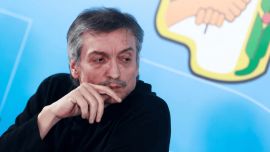The death toll among dozens of people who consumed cocaine likely laced with opioids in Buenos Aires Province rose to 24 on Friday, with 23 still in hospital, according to provincial health officials.
Two of the hospitalised remain in a serious condition and on mechanical ventilation, officials told reporters on Friday afternoon. They said 20 men and three women aged 21 to 58 have died since Tuesday night from adulterated cocaine” bought from dealers in the Villa Puerta 8 settlement, a poor neighbourhood around 40 kilometres from the capital.
Most died far from the point of sale, 12 of them at home and two on the road, unable to make it to a hospital on time because of the sudden effects of the tainted drug, prosecutors believe. Many suffered heart attacks and convulsions.
Thirty-seven remained hospitalised on Friday in seven different hospitals in Tres de Febrero, San Martín and Hurlingham, according to a provincial government update.
Three of them had been previously discharged but had to be re-hospitalised after taking more of the cocaine, provincial Health Minister Nicolás Kreplak said.
More than 200 other people sought medical intervention after consuming the substance, presenting symptoms of varying degrees of gravity.
Arrests and seizures
Thirteen people rounded up in a police operation to establish the origins of the tainted drug were due to appear before magistrates as part of the ongoing investigation, according to the Télam state news agency.
They include Joaquín Aquino, the well-known leader of a drug-trafficking network in Greater Buenos Aires, nicknamed ‘El Paisa.’ Migration officials announced Friday that the 33-year-old Paraguayan national had been issued with an expulsion order due to his arrest for drug-trafficking. He has been banned from re-entering the country for the next eight years and had his residency withdrawn.
The substance with which the cocaine was laced has not yet been confirmed, but authorities say it is likely an opioid.
Earlier this week, police seized more than 20,000 doses of cocaine in a series of raids, but have not revealed how many of these were from the laced batch.
The incident has brought to light the dangers of illegal drug use, especially of cheap, low-quality cocaine sold and consumed in poor areas and their communities.
According to Buenos Aires Province Security Minister Sergio Berni, at least 250,000 doses of cocaine are sold daily in the region, which is home to some 40 percent of the population and has a number of areas with high poverty rates.
Officials said Thursday that things were under control, but urged recent buyers of cocaine in and around the capital to throw it away.
"Every dealer that buys cocaine cuts it. Some do it with non-toxic substances such as starch. Others put hallucinogens in it, and if there is no form of control, this kind of thing happens," Berni claimed.
'Absolutely exceptional'
San Martín public prosecutor Marcelo Lapargo has said what happened was "absolutely exceptional" and there was "no precedent" in Argentina.
Argentina became part of international drug-trafficking routes in the 1970s. By the mid-1980s, half a tonne of cocaine was being seized every year, and a decade later, four times more, according to official records.
In 2017, a record 12.1 tons of cocaine were seized in the country, but in 2020, the number fell to about 2.7 tons as consumption dropped during the pandemic.
In an interview with the Noticias Argentinas news agency earlier this week, Claudio Izaguirre, the president of the Anti-Drug Association of Argentina, said that the purity of cocaine at street level in the country is approximately 15 percent, with nearly all drugs cut by dealers prior to sale. He criticised the security forces for "knowing where drugs are sold" but "doing nothing to stop their sale."
Sociologist Alberto Calabrese, an expert in addictions, told AFP this week that the under-reporting of illegal drug use in the country "is very high" and that "in conditions of poverty and a lack of horizons it is very likely that consumption of whatever it is will increase."
"The problem should not be seen exclusively in terms of poverty, because that would be a mistake, it cuts across society, with both legal and illegal drugs," Calabrese said.
Greater Buenos Aires has poverty rate of 45.3 percent and an unemployment rate of 10.1 percent, according to the INDEC national statistics bureau.
– TIMES/AFP/NA



















Comments